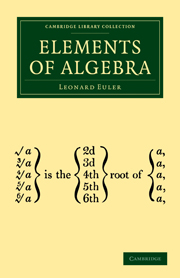Book contents
- Frontmatter
- ADVERTISEMENT
- MEMOIR OF THE LIFE AND CHARACTER OF EULER, BY THE LATE FRANCIS HORNER, ESQ., M. P.
- ADVERTISEMENT BY THE EDITORS OF THE ORIGINAL, IN GERMAN
- ADVERTISEMENT BY M. BERNOULLI, THE FRENCH TRANSLATOR
- Contents
- PART I Containing the Analysis of Determinate Quantities
- SECTION I Of the Different Methods of calculating Simple Quantities
- SECTION II Of the different Methods of calculating Compound Quantities
- SECTION III Of Ratios and Proportions
- SECTION IV Of Algebraic Equations, and of the Resolution of those Equations
- Chap. I Of the Solution of Problems in General
- Chap. II Of the Resolution of Simple Equations, or Equations of the First Degree
- Chap. III Of the Solution of Questions relating to the preceding Chapter
- Chap. IV Of the Resolution of two or more Equations of the First Degree
- Chap. V Of the Resolution of Pure Quadratic Equations
- Chap. VI Of the Resolution of Mixed Equations of the Second Degree
- Chap. VII Of the Extraction of the Roots of Polygonal Numbers
- Chap. VIII Of the Extraction of Square Roots of Binomials
- Chap. IX Of the Nature of Equations of the Second Degree
- Chap. X Of Pure Equations of the Third Degree
- Chap. XI Of the Resolution of Complete Equations of the Third Degree
- Chap. XII Of the Rule of Cardan, or that of Scipio Ferreo
- Chap. XIII Of the Resolution of Equations of the Fourth Degree
- Chap. XIV Of the Rule of Bombelli, for reducing the Resolution of Equations of the Fourth Degree to that of Equations of the Third Degree
- Chap. XV Of a new Method of resolving Equations of the Fourth Degree
- Chap. XVI Of the Resolution of Equations by Approximation
- PART II Containing the Analysis of Indeterminate Quantities
- ADDITIONS BY M. DE LA GRANGE
Chap. I - Of the Solution of Problems in General
Published online by Cambridge University Press: 05 July 2011
- Frontmatter
- ADVERTISEMENT
- MEMOIR OF THE LIFE AND CHARACTER OF EULER, BY THE LATE FRANCIS HORNER, ESQ., M. P.
- ADVERTISEMENT BY THE EDITORS OF THE ORIGINAL, IN GERMAN
- ADVERTISEMENT BY M. BERNOULLI, THE FRENCH TRANSLATOR
- Contents
- PART I Containing the Analysis of Determinate Quantities
- SECTION I Of the Different Methods of calculating Simple Quantities
- SECTION II Of the different Methods of calculating Compound Quantities
- SECTION III Of Ratios and Proportions
- SECTION IV Of Algebraic Equations, and of the Resolution of those Equations
- Chap. I Of the Solution of Problems in General
- Chap. II Of the Resolution of Simple Equations, or Equations of the First Degree
- Chap. III Of the Solution of Questions relating to the preceding Chapter
- Chap. IV Of the Resolution of two or more Equations of the First Degree
- Chap. V Of the Resolution of Pure Quadratic Equations
- Chap. VI Of the Resolution of Mixed Equations of the Second Degree
- Chap. VII Of the Extraction of the Roots of Polygonal Numbers
- Chap. VIII Of the Extraction of Square Roots of Binomials
- Chap. IX Of the Nature of Equations of the Second Degree
- Chap. X Of Pure Equations of the Third Degree
- Chap. XI Of the Resolution of Complete Equations of the Third Degree
- Chap. XII Of the Rule of Cardan, or that of Scipio Ferreo
- Chap. XIII Of the Resolution of Equations of the Fourth Degree
- Chap. XIV Of the Rule of Bombelli, for reducing the Resolution of Equations of the Fourth Degree to that of Equations of the Third Degree
- Chap. XV Of a new Method of resolving Equations of the Fourth Degree
- Chap. XVI Of the Resolution of Equations by Approximation
- PART II Containing the Analysis of Indeterminate Quantities
- ADDITIONS BY M. DE LA GRANGE
Summary
563. The principal object of Algebra, as well as of all the other branches of Mathematics, is to determine the value of quantities that were before unknown; and this is obtained by considering attentively the conditions given, which are always expressed in known numbers. For this reason, Algebra has been defined, The science which teaches how to determine unknown quantities by means of those that are known.
564. The above definition agrees with all that has been hitherto laid down: for we have always seen that the knowledge of certain quantities leads to that of other quantities, which before might have been considered as unknown.
Of this, Addition will readily furnish an example; for, in order to find the sum of two or more given numbers, we had to seek for an unknown number, which should be equal to those known numbers taken together. In Subtraction, we sought for a number which should be equal to the difference of two known numbers. A multitude of other examples are presented by Multiplication, Division, the Involution of powers, and the Extraction of roots; the question being always reduced to finding, by means of known quantities, other quantities which are unknown.
565. In the last section, also, different questions were resolved, in which it was required to determine a number that could not be deduced from the knowledge of other given numbers, except under certain conditions.
- Type
- Chapter
- Information
- Elements of Algebra , pp. 186 - 189Publisher: Cambridge University PressPrint publication year: 2009First published in: 1822



